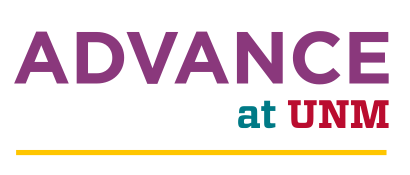Associate professors get tips on moving up

Associate professors got advice and learned about resources for moving on to full professor during a panel hosted by Advance at UNM.
Audience members heard about goal setting, understanding expectations and seeking support from others so they can avoid stalling out.
Presenters included Advance at UNM director Julia Fulghum, Mary Jo Daniel, director of UNM’s Faculty Research Development Office, UNM Biology professor Tina Takacs-Vesbach and Phil Ganderton, the senior associate dean and associate dean of faculty in the College of Arts and Sciences.
Fulghum said that while there are some common ways to be promoted, each person’s path can and should be unique.
“This really is a choose your own adventure story. Think about that first,” she said.
“Think of what you want to excel at, not necessarily about a certain number of presentations you need to make,” she said.
Takacs-Vesbach said it helped her promotion path to make a plan with her department chair and colleagues first, and to think of promotion as a plan that might be 50 years long instead of five.
“Don’t let an individual set back get you down,” she said.
“Think of this more as a long-distance race and not a sprint,” she said.
Takacs-Vesbach also encouraged audience members to not be afraid to ask for help along the way.
“Don’t do this one alone,” she said.
One area that faculty often need help with is research.
Daniel said there are a wealth of resources available through her office to help. One of her tips is to think about focusing on the broader meaning of faculty research.
“Think about the impact you want your research to have on the world,” she said.
She also said that professors should start small when thinking about applying for grants.
“Don’t go for a $20 million grant first time out…there are smaller pieces out there that you can go for,” she said.
“Rise above the urge to do it alone. Get some help.”
Ganderton said one tip for associate professors is to think of their dossier and the review process as a place to shine.
“Create subsections within the sections of the dossier in order to bring out the breadth and the depth of your scholarship,” he said. “This is your time to shine.”
He encouraged professors to remain upbeat about what they’ve done.
“As you’re preparing for promotion, be positive yourself. Focus on what you’re doing and focus on what you have done. Don’t focus on what you haven’t done.”
Faculty resources
Career management: ADVANCE at UNM workshops focus on topics like when and how to say no, how to craft your best grant proposal and how to better manage your time.
Advance at UNM also offers confidential meetings and on-line resources where you can ask your career questions.
If you are an associate professor in Arts and Sciences who has had a significant service load or career disruption, you also should know about the A&S Career Advancement Semester, which has a February 26, 2018 deadline.
Important UNM policies: There are so many rules and regulations for faculty and staff! We’ve compiled a list for you.
Life management: We all know balance can be tough. UNM Counseling, Assistance and Referral Services can help you through the big hurdles and UNM’s World of Wellness fitness class program offers times to sweat it all out.
Research: The Faculty Research Development Office should be your first stop for information on research. The office offers monthly meetings at our office with advice on various topics and time to ask your questions.
For information on Research Allocation Grants, see this.
We also host the Women in STEM grants, which have a March 26, 2018 deadline.
For writing support (publications), ADVANCE at UNM is planning a writing accountability group. Stay tuned for details. We also offer weekly Shut Up and Write sessions, when our office becomes a quiet zone so you can focus on your work.
Teaching: The UNM Center for Teaching and Learning offers workshops, in-class observations, advice,
a Teaching Fellows program, Teaching Allocations Grants and more.
Ombuds/Dispute Resolution Services for Faculty: When you need a third party to weigh in, professionals at this office can help.
Student health and accomodation
UNM’s Student Health and Counseling has an ask a question tab for questions about a students who are experiencing mental health challenges.
UNM’s Accessibility Resource Center (ARC) has information on acommodating all students.
Students or faculty in crisis can call the
AGORA Crisis Center at 505-277-3013.
Visit advance.unm.edu for more information or follow us on Facebook. Download this info as a PDF here.
